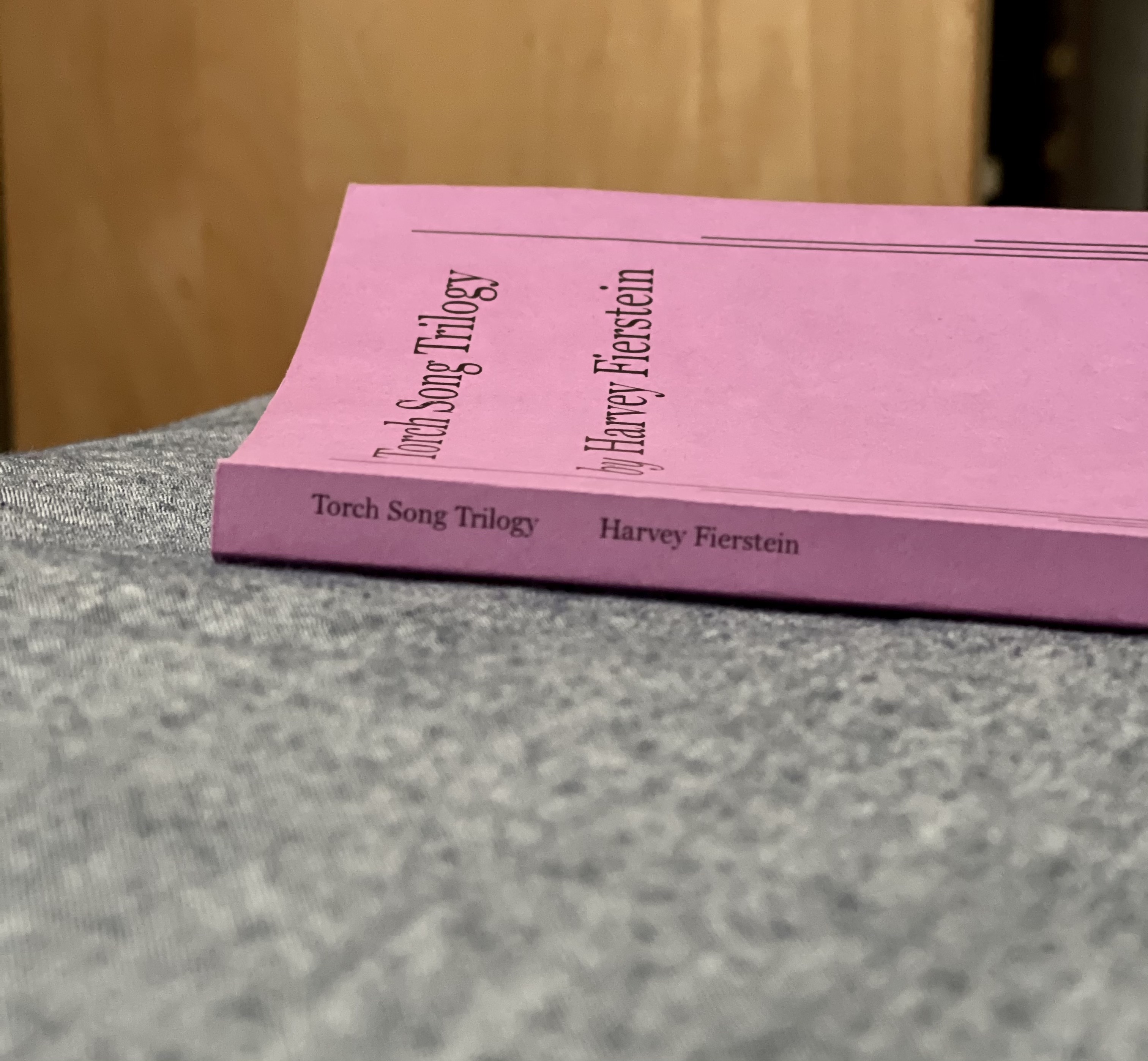Torch Song Trilogy
*Spoilers*

Holy cow. How have I missed this play before??
To be fair, I really have no excuse. One of my best friends, Harvey, did a staged reading of parts of this show while we were in college. Being in the same theatre program, I was recruited to voice one of the female characters for this presentation at the 11th hour. It was a “day of” type thing that I threw myself into with full force, but had only read the sides I was given- not the full show. (Actors: this is generally a HUGE no-no, but I had to work on the fly!).
Upon the first reading of all three in a row, I was absolutely FLOORED by how much I connected to this story and felt for our main character, Arnold.
The first show opens in Arnold’s drag bar (The International Stud) and has a few monologues from both he and his new love interest, Ed.
Arnold immediately endears himself to the audience by not being a caricature of a gay man or a drag queen. He is a balanced, fully fleshed-out character that skates a fun line between his constant witticisms (“Try as I may, I just can’t walk in flats”) and painful truths. He does not see himself as particularly stunning (“I will never be young and beautiful”), but he is a romantic. I typically am not a fan of long monologues in plays because I find it does not always do the pacing any favors, but I have yet to stumble across such masterfully crafted ones as here.
The first moment of heartbreak occurs on a painful phone call to his (now ex) lover, Ed, though it seems clear from the beginning that Arnold knows exactly how this call will go. Ed struggles through the entire trilogy with his sexuality and what it means to be an out gay or bisexual man in the 1970s. Arnold calls him out on his secret shame, proclaiming that he knows Ed isn’t scared for his parents to meet Arnold- “…you weren’t scared for them to meet me. You’re scared they’ll meet you.”
Facing who he is and what he wants is Ed’s inner turmoil, but his unwillingness to introduce Arnold to the people in his life is a choice they can not move forward from together. Towards the end of this painful scene, Ed asks Arnold what he is thinking, and is met with the deeply sad line, “I am thinking about how it feels to be a no one in the life of someone you love.”
Arnold tries to move forward in the arms of other lovers in the backroom of the club, a place he had sworn to himself never to go. And again, has a hilarious and tragic monologue while engaging in full-blown intercourse with a man who doesn’t know his name (and never speaks to him). The disconnect of Arnold’s deep desire for true intimacy and love is at war with his need to feel wanted in this moment. He tries to foster some sort of connection within the dark shadows of the backroom, the stranger thrusting behind him. He remarks candidly- “You know, I really like you. Maybe that’s a stupid thing to say in a place like this.”
In the final scene of Act 1, Arnold holds his ground as Ed returns to confront him. He has grown during these months apart and accepted that they can’t go backwards, only forward- “I have never done time in the closet and I sure as hell ain’t gettin’ in one for you.”
“…you weren’t scared for them to meet me.
You’re scared they’ll meet you.”
Part 2 (Fugue in a Nursery) picks up a year later to introduce us to Ed’s female partner, Laurel, and Arnold’s new 18-year old boytoy, Alan.
Laurel, to my surprise, enters as a fun foil for both Arnold and Ed to play off of. The way Ed describes her initially presents the character as an unattractive dullard, who is no more than a “safe” way for him to hide under the guise of a heterosexual relationship. But Laurel comes in straight out the gate to invite her lover’s ex (Arnold) and his new partner to their farm upstate for the weekend. In fact, she almost revels in the situation. She remarks to Ed, “Imagine being a hostess to your lover’s ex and his new boyfriend. Now if that isn’t civilized then what is?” She is a force of nature in her own way.
The four of them begin a very complex dance over the course of this segment where we see every combination of pairings, testing the waters and their individual boundaries. Alan is young and naive, fighting for the same love and attention from Arnold that Arnold once did with Ed. He continually asks Arnold why he loved Ed (but doesn’t love him), and Arnold responds yet again with such a universal human truth- “Because…I did. Because…he let me.” What is a more honest way to describe why you love someone?
Ed ends up seducing Alan in the barn, making him believe that the terms of their open relationship allow for this, while Arnold and Laurel form an unlikely friendship of their own. This portion of the play dances around some poly concepts, to which Arnold remarks “I can’t tell with these “Make ‘em up as you go along” rules. Monogamy’s a much easier system to keep track of.” Though we know he deeply yearms for a true love connection, he is still sexually engaging with the man in the backroom of International Stud. Part 2 concludes with the couples still firmly intact, Laurel and Ed are engaged to be married and Arnold and Alan have signed a contract to adopt a dog together.
“I am thinking about how it feels to be a no one in the life of someone you love.”
The third and final installment (Widows and Children First!), continues their story five years down the road.
We learn quite quickly that Ed is now separated from his wife and sleeping on Arnold’s couch, and that Alan has died. In this installment, we meet Arnold’s mother and his new, soon-to-be adopted son, David. David’s witty banter is a carbon copy of his new father’s and he more than keeps up with the adults in the room. He is non-stop quips and wisecracks, but also seems to be the only person that truly “gets” Arnold. Paralleling the technique of the revolving door in part 2, all the characters find little moments to interact just the two of them. We gain far more insight into the nuances of their relationships through this fast-paced scene structure.
Arnold and his mother’s relationship starts in a light-hearted, fun realm. The traditional Jewish mother nagging her son, making latkes, and criticizing his place. But, their conversations quickly get heated as she sneers over his loss of Alan, deeming it substandard to the loss she felt at his father’s death. Her lack of understanding of love in all its forms is clear as Arnold points out how alone he has felt- “You have thirty-five years to remember, I have five. You had your children and friends to comfort you, I had me!”
It’s not about comparing pain, but her invalidating their love as if it is less meaningful or genuine than her heterosexual marriage. It all comes to a head as he screams at her and we find out the horrific, violent truth of Alan’s death. He condemns his mother for being part of the problem, her and people like her who believe they are different- “Cause everyone knows that queers don’t matter! Queers don’t love! And those that do deserve what they get.”
His mother grows increasingly cruel, claiming that he was the source of his father’s illness and that had she known that he’d be gay, she would not have bothered bringing him into the world. We see finally why Arnold is so desperate for the same unconditional love and acceptance he gives others, he has never had it before. In her mind, he is sick and can not be trusted to raise a healthy child.
Ed reveals his true feelings for Arnold to David, who encourages him to go after Arnold one last time. Arnold again laments about the new dynamic they are proposing, cohabiting men in a relationship with an adopted gay son (“I don’t even know what this is supposed to be. I can’t exactly buy a book or study some Reader’s Digest article that’s gonna tell me.”). Not being able to legally marry or even legitimize their relationship to their families is a tragedy in and of itself.
“I have never done time in the closet
and I sure as hell ain’t gettin’ in one for you.”
Arnold’s core principles are love and acceptance, which he uses as a guide throughout his life and in raising his new son. There is no one way to be a man anymore than there is one way to have a good relationship. Even today, 50 years later, people who do not fit society’s molds are still ostracized and discriminated against for any kind of alternative lifestyles. But when we truly respect and love ourselves, as Arnold does by the final show’s completion, what the rest of the world thinks pales in comparison. He is older now, knows his worth, and is grateful for the people in his life that accept him as the deeply funny, loving, beautiful queen he is.
Five stars for a reason ya’ll. I am ready to rent a stage and produce this thing myself as soon as live theatre comes back, because DAMN if this show didn’t move me. The themes are universal, the drama real, but with an underscore of humanity and wit that drives it. The characters are entertaining and hilarious at times, but their utter vulnerability is what makes us root for them. We can see ourselves in their moments of triumph and defeat and be inspired to pick back up again and keep moving forward. I already texted Harvey to remind him what an incredible senior piece he picked!
“I guess a drag queen’s like a oil painting:
You gotta stand back from it to get the full effect.”
Wanna read more of my favorite books?
Check out my BookShop Affiliate page to aid in their mission to financially support local, independent bookstores!


2 Comments
Stephanie
I was moved just reading this review… makes me want to read the whole thing, and I’m not usually a play reader!
Devony DiMattia
I can send you my copy! Well worth the read; such an important story ❤